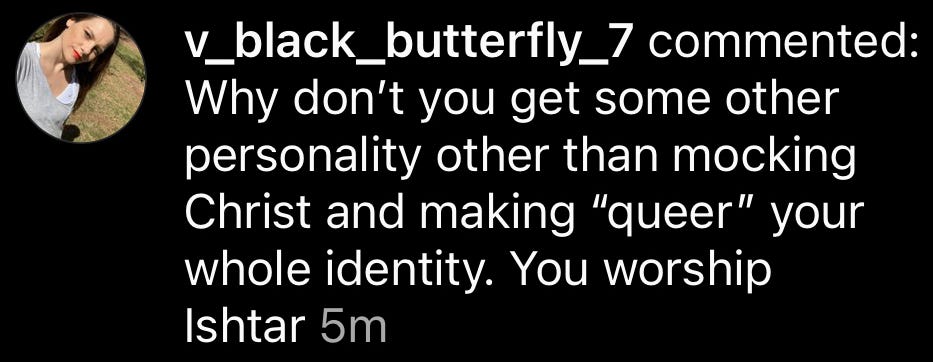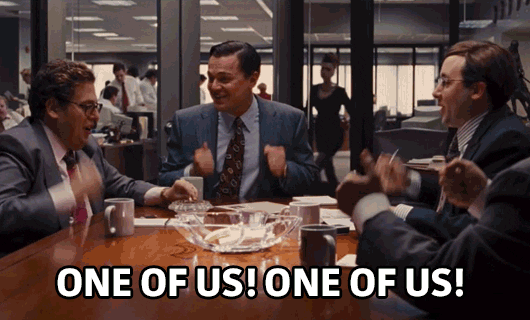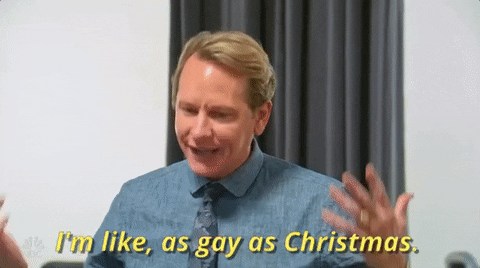The wrong kind of gay
What people really mean when they say we should stop making queerness our whole personality
CW: Homophobia; racism; ableism
Ever since I started making queer content online, I’ve had to field a daily barrage of homophobic comments. The comment I get most often (besides being told I’m going to hell) is some variation of, “Why does being gay have to be your whole personality?” It often comes after the statement, “I don’t care if you’re gay, but…” and tends to be in close company with comments like, “Stop shoving your gayness down our throats,” or “Quit forcing your queerness on everyone.”

The intention of comments like these isn’t to be factual. I don’t know a single queer person whose “whole personality” literally revolves around their queerness. Rather, it’s the same cishet people accusing queer folks of making their sexual orientation/gender identity their whole personality who are also the ones painting all visible and vocal queer folks with a broad brush and refusing to see beyond our queerness.
To them, I’m a rainbow-wielding, man-eating, lesbian content creator with no other identity. But that’s only because they won’t acknowledge the infinite number of other things that make up who I am, including being a mixed-race Iranian-American, a neurodivergent person, a fiancée, an aunt, a writer, a former lawyer, a musician, an elder emo kid, a book nerd, an avid hiker, a dog mom, and a talented gift giver.
The subtext of these types of comments about our personalities is clear: “You’re doing queerness wrong.”
Which begs the question, what exactly does it look like to do queerness “right?” Further, who gets to define how much queerness is too much queerness? And if queerness is only acceptable when it’s quiet or even undetectable, what differentiates it from straightness and cisness?
That right there, comrades, is the whole point. In a cisheteronormative society, queerness is seen as “other.” Its very existence makes people uncomfortable because it’s not “normal” to them. So the only way those people can tolerate queerness is by putting conditions on it that leave the status quo relatively unscathed.
This expectation of assimilation is something that members of all marginalized groups run up against.
You can be queer, just as long as you’re not too “flamboyant” about it, you don’t engage in any public displays of affection, and you never talk about how you identify.
You can be Black, just as long as you don’t expect any “special treatment,” and you don’t “sound” too Black, wear your hair natural, or act too “ghetto.”
You can be disabled, just as long as you don’t drain our healthcare resources or take government assistance, and you only live in ways able-bodied people will find “inspirational.”
Limitations like these create impossible standards that restrict marginalized people in exchange for the comfort of the majority. By design, they also pit marginalized people against each other and lead some folks in our communities to take on a sort of “cool girl” mentality in hopes of garnering privilege—“I’m not like those other cringey queers who adorn themselves in rainbows and have no personality outside of their sexual identity! I’m a cool queer who keeps my head down and who you’d never know was gay.” I’ve actually had queer people and well-meaning “allies” in my comments suggest that the best revenge against homophobes would be for me to live a good, queer life (presumably as quietly as possible) and stop speaking out.
In reality, there are plenty of reasons why for some queer people, myself included, queerness is a big part of our identities. Most cishet people wouldn’t say that cisness and straightness are big parts of their identities, but that’s only because cis-straight culture is the air we all breathe. It’s embedded into everyone’s personality unless they consciously choose to opt out.
When I was growing up, cishet people and cishet relationships were centered in 99.9% of the books and magazines I read, the shows and movies I watched, the music I listened to, the examples given in homework assignments and textbooks, etc. Straightness was so omnipresent in my life that I didn’t even begin to question if I was queer until my late twenties, and I didn’t realize I was a lesbian until I was thirty and had already been married to a man. This meant that I didn’t get the opportunity to start learning about queer history and queer culture until just a couple of years ago, so can you blame me for going hard on it? I’m making up for decades of lost time, and I finally have the chance to see myself in fashion, novels, songs, and television in ways I couldn’t before.
Additionally, being queer is not neutral in a homophobic and transphobic world. For most of us, our queerness has had a huge impact on our lives. Many of us grew up without getting the chance to truly know ourselves, or we needed to hide or dim who we are. Many of us have lost family and friends, experienced bullying, harassment, and violence, and been deprived of certain life and career opportunities simply for being ourselves.
Circumstances may be better than they used to be for the LGBTQIA+ community as a whole, but we are far from equal under the law and in the court of public opinion. Consequently, being an out queer person remains an act of resistance, and no one has a right to tell us how we should be protesting our mistreatment.
During Pride Month and every day of the year, I will be as gay as I damn well please, whatever that means to me. I’ll also give you the freedom to do the same without commentary.
As queer people, we each get to make our own decisions about how loud and proud we want to be, how glamorous and extravagant we want to be, and how public with our relationships we want to be. We don’t need permission from cishet people to feel at home in our own skin and celebrate all that we’ve been forced to overcome, and I refuse to be baited into a hierarchy of queerness where some queer people are seen as better than others because of how they choose to talk, dress, act, love, and live.
The bottom line is this: There are no “buts” allowed when it comes to standing with the LGBTQIA+ community—either you support us in being our whole, authentic selves (even when it makes you uncomfortable), or you’re not an ally. The choice is up to you.
Queerly yours,
Shohreh
To get in touch, shoot me an email at hello@shohrehdavoodi.com. For more from me, follow me on Instagram, TikTok, and Threads.
If you'd like to support me outside of becoming a paid subscriber to The Queer Agenda, you're welcome to purchase a gift for me from my Amazon Wishlist or purchase an item for yourself from my Amazon Storefront, which contains all of my most-recommended products.












